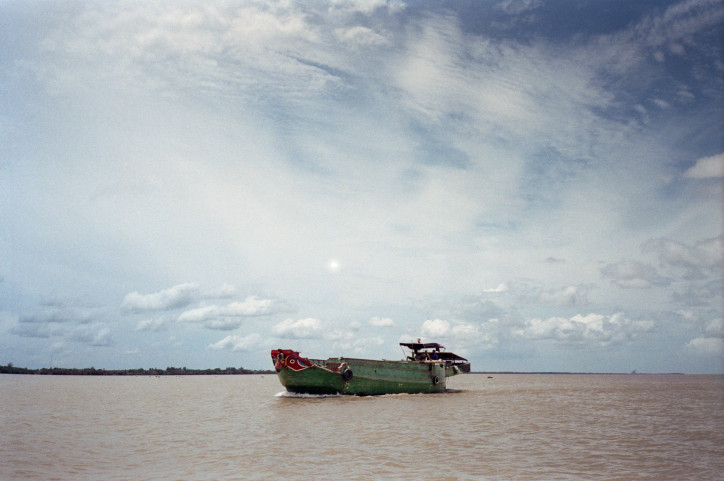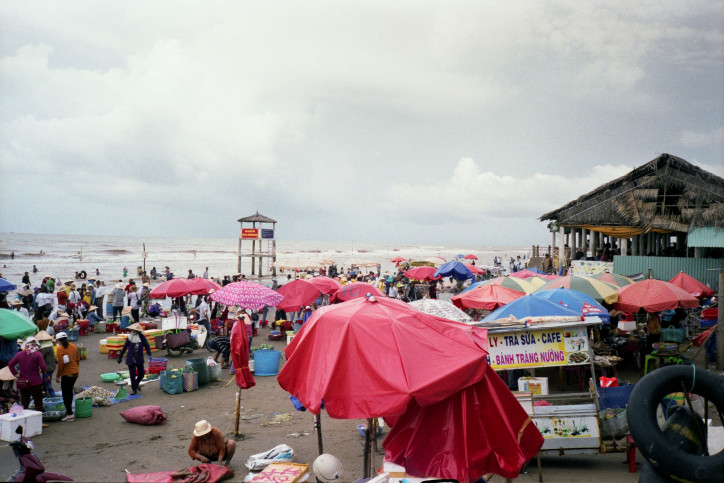
This is a story of a river that has lost its ending. Humans have robbed it of its power. This is the story of the Mekong River and its people, who have to push back from the very edge of survival, day by day.
Wet hands push the last crate, filled with fish and crushed ice. The container slides down a narrow shelf that connects the fishing boat with the shore. Someone washes it with a hose, someone else catches the box and puts it away, in a pile of other identical crates. Someone attaches a metal hook to it and drags it aside, to the women. The women sit on tiny stools. They take incoming portions of fish in their stride, not once breaking away from their conversations. One of them gets up and upends the crates. Several hands in rubber gloves reach, grabbing fish, turning them around, segregating, throwing into assigned baskets. There is certainty in every move they make. Speed without any rush. Precision without automation. The fish are examined, cleaned, sent on their way after expert consideration.
Some will be filleted; women sitting nearby are splitting their bulky silver bodies with small hooked knives. Just a few movements are enough to disembowel, cut out the gills, throw away the head. The heads smell the worst; they will be milled and canned. Larger fish go into cargo trucks, their flesh protected with ice, brought here in metre-long blocks. You need to get it on hooks, then hammer it into pieces or push it into the gaping mouth of the noisy ice crusher. On the other side of the machine, bowls filled with icy shards ride by. Workers take the fish, nestled in the cold fluff, and carry it in crates into the truck. Before breakfast, the cargo will already reach the markets of Saigon. Then, the fish will travel from the largest markets to the smaller ones in various districts. The next stop will be bowls of steaming food at homes, restaurants and street food carts.
Naked torsos, glistening shoulders. Hefting and pushing. Some fish will go to the market just by the shelter nearby. Here, you can buy in bulk and then sell it around the districts of Mỹ Tho, the first large city by the Mekong River Delta.
Everyone at the riverbank knows their roles, everyone is busy. It’s like a contract agreed a long time ago and kept in place ever since; now, mere minutes after dawn, the workers operate in perfect harmony, their moves and gestures merging in one great symphony of duties.

zdjęcie: Paulina Wilk

The fishermen gather on the boat. A few have emerged through the hatch of the cargo hold, now emptied. Rubber boots, sweaty T-shirts, dirty trousers, pushed into the shoe legs. The men are rushing to the pot. It stands among them now, steaming and large. Bowls and chopsticks go from hand to hand, a ladle dances above the hot surface. Before, they chattered and laughed, shouting merrily to one another. Now, there is none of that. They all crouch and slurp, sucking in the noodles, vegetables and meaty stock; they gnaw at beef bones. Leftovers fly over the board and into the water. Before they arrived at Mỹ Tho, they had spent almost a whole month at sea. The one they call the Eastern Sea in Vietnam, but the Chinese consider their own internal water basin, labelled the South China Sea in atlases. The men have been fishing for over three weeks, and now, for one week, they will rest by the river. They have a reason to be happy; the cargo hold was filled to the brim. And they were not the only ones. Round-bellied fishing boats, all painted blue, have been arriving at the riverbank since three in the morning, all of them heavy with the catch. Tomorrow will be peak traffic – it will be a full moon. Everyone will have a drink and celebrate a bit. Local fishermen live by the moon calendar, using it to measure the rhythm of their fishing trips, too. A few days before the full moon, their nets are bursting at the seams with fish. It’s rather unusual; in general, it’s only getting worse. They have to go further and further out, leaving their own waters and into the most disputed sea in the world, or to the Gulf of Thailand. There aren’t enough fish left, and there will be fewer. Over 90 million people are living in Vietnam right now, and the economy is growing quickly. The demand is increasing, both locally and outside the country. As a result, excessive fishing has already led to the decimation of the population of fish and seafood in the region.
The Delta is still








